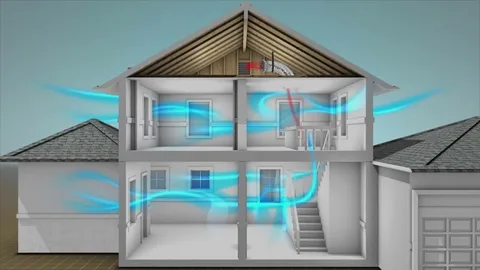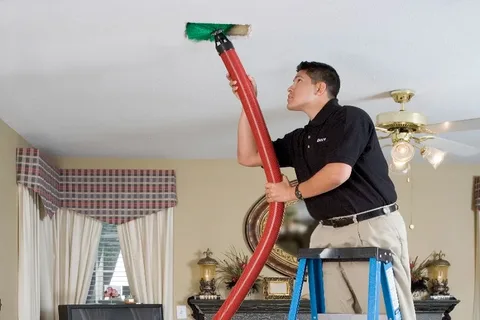Having a well-ventilated home is essential for the health and comfort of your family. A house ventilation system ensures that the air in your home is clean and fresh, while also preventing moisture build-up and controlling the temperature. In this blog post, we’ll discuss why house ventilation is important and what you can do to improve it in your home. We’ll also explore different types of house ventilation systems and their benefits. Read on to learn more about house ventilation and why it’s important for your home.
What is House Ventilation?
House ventilation refers to the process of exchanging air within a home to maintain good air quality. It involves removing stale, polluted air and replacing it with fresh, clean air from outside. This exchange of air helps to regulate temperature, remove odors, and reduce the level of airborne contaminants.
House ventilation systems work by using fans and ducts to circulate air throughout the home. There are various types of ventilation systems, such as exhaust-only systems, supply-only systems, and balanced systems. Each type has its own advantages and is suitable for different types of homes.
Proper house ventilation is crucial for several reasons. Firstly, it helps to prevent the buildup of excess moisture, which can lead to mold and mildew growth. It also helps to control temperature, ensuring a comfortable living environment. Additionally, house ventilation reduces the concentration of indoor pollutants, such as allergens, chemicals, and volatile organic compounds (VOCs), which can have detrimental effects on health.
In summary, house ventilation is the process of exchanging indoor air with fresh outdoor air to maintain a healthy and comfortable living environment. It plays a vital role in regulating temperature, removing pollutants, and preventing moisture buildup. Understanding the importance of house ventilation can help you make informed decisions about improving the air quality in your home.
The Benefits of Good Indoor Air Quality
Good indoor air quality is essential for the health and well-being of your family. Breathing in clean, fresh air can have numerous benefits for both your physical and mental health. Here are some of the key benefits of good indoor air quality:
- Improved Respiratory Health: When the air in your home is free from pollutants, allergens, and irritants, it can significantly improve respiratory health. Clean air reduces the risk of asthma, allergies, and other respiratory conditions.
- Enhanced Sleep Quality: Breathing in clean air can help you sleep better at night. Fresh air promotes relaxation, improves oxygen flow to the brain, and reduces the risk of sleep disorders like insomnia.
- Increased Energy Levels: Poor indoor air quality can leave you feeling fatigued and drained. On the other hand, breathing in clean air can increase your energy levels, improve concentration, and boost productivity.
- Reduced Allergy Symptoms: Indoor pollutants like dust mites, pet dander, and pollen can trigger allergies and worsen symptoms. Good indoor air quality helps reduce allergy triggers and alleviates symptoms like sneezing, coughing, and itchy eyes.
- Enhanced Mood and Mental Health: Breathing in fresh air can have a positive impact on your mood and mental health. It can help reduce stress, anxiety, and depression, leaving you feeling happier and more balanced.
Investing in a good house ventilation system can help you achieve and maintain good indoor air quality. By removing pollutants and circulating fresh air, these systems provide numerous benefits that contribute to a healthier, happier home environment.
How Poor Ventilation Can Affect Your Health
Poor ventilation in your home can have significant effects on your health and well-being. When the air in your home is stagnant and filled with pollutants, it can lead to a variety of health issues.
One of the primary risks of poor ventilation is the accumulation of harmful contaminants in the air. These can include dust mites, pet dander, pollen, mold spores, and even toxic chemicals from household products. Breathing in these pollutants regularly can trigger or worsen respiratory conditions like asthma and allergies. It can also cause symptoms such as coughing, sneezing, wheezing, and shortness of breath.
Another consequence of poor ventilation is the increase in humidity levels. Without proper airflow, excess moisture can accumulate, creating the perfect breeding ground for mold and mildew. These fungi release spores into the air, which can irritate the respiratory system and trigger allergic reactions.
Furthermore, inadequate ventilation can lead to a buildup of carbon dioxide (CO2) in your home. High levels of CO2 can cause symptoms like headaches, dizziness, and difficulty concentrating. It can also lead to fatigue and poor sleep quality.
Understanding the Different Types of House Ventilation Systems
When it comes to house ventilation, there are several different types of systems that you can choose from. Understanding the different options available can help you make an informed decision about which system is best for your home.
One common type of house ventilation system is the exhaust-only system. This system uses fans to draw air out of your home, creating negative pressure and allowing fresh air to enter through cracks and gaps in the building envelope. This type of system is relatively simple and cost-effective, but it may not be as efficient in terms of air distribution throughout the home.
On the other hand, supply-only systems work by bringing fresh air into the home through fans and ducts. This helps to pressurize the home, pushing stale air out through cracks and gaps. These systems are often used in conjunction with exhaust fans in bathrooms and kitchens to ensure proper air exchange.
 Balanced systems, as the name suggests, provide a balance between supply and exhaust. These systems use fans to bring in fresh air and exhaust stale air at the same time. They often incorporate heat recovery or energy recovery systems, which help to regulate temperature and improve energy efficiency.
Balanced systems, as the name suggests, provide a balance between supply and exhaust. These systems use fans to bring in fresh air and exhaust stale air at the same time. They often incorporate heat recovery or energy recovery systems, which help to regulate temperature and improve energy efficiency.
Each type of ventilation system has its own advantages and is suitable for different types of homes. It’s important to consider factors such as the size and layout of your home, as well as any specific requirements or concerns you may have, when choosing a ventilation system. Consulting with a professional can help ensure that you select the system that best meets your needs.
How to Choose the Right House Ventilation System for Your Home
When it comes to choosing the right house ventilation system for your home, there are several factors to consider. First, you need to assess the size and layout of your home. Larger homes may require more powerful ventilation systems to adequately circulate air throughout all the rooms. On the other hand, smaller homes may be able to rely on simpler ventilation systems.
Next, think about any specific requirements or concerns you have. For example, if you live in a humid climate, you may want to prioritize a ventilation system that helps control moisture levels. If you have family members with respiratory conditions or allergies, you’ll want a system that effectively filters out allergens and pollutants.
Consulting with a professional can be incredibly helpful in making this decision. They can assess your home’s unique needs and recommend the best ventilation system for you. Additionally, they can ensure that the installation is done properly, which is crucial for the system’s effectiveness and longevity.
Remember, choosing the right house ventilation system is an investment in your family’s health and comfort. By taking the time to assess your home’s needs and consult with a professional, you can make an informed decision and enjoy the benefits of a well-ventilated home.
The Importance of Proper Installation and Maintenance of Your House Ventilation System
Proper installation and maintenance of your house ventilation system is of utmost importance in ensuring its effectiveness and longevity. While investing in a good ventilation system is essential, it’s equally important to have it installed correctly and regularly maintained to reap its full benefits.
Firstly, proper installation is crucial to ensure that your ventilation system is working efficiently. A professional installer can assess your home’s unique requirements and recommend the best system for you. They will ensure that the system is correctly installed, allowing for optimal air circulation throughout your home. This will help prevent any potential issues or malfunctions down the line.
Furthermore, regular maintenance is essential to keep your ventilation system running smoothly. This includes cleaning or replacing filters, inspecting and cleaning ducts, and checking the system’s components for any signs of wear or damage. Regular maintenance helps to ensure that the system is operating at its best, providing clean and fresh air for your home.
Neglecting proper installation and maintenance can result in reduced air quality and inefficient operation of your ventilation system. This can lead to increased energy consumption, poor air circulation, and even potential health risks. By prioritizing the installation and maintenance of your ventilation system, you can enjoy a healthier and more comfortable living environment for years to come.
Remember, when it comes to your house ventilation system, proper installation and regular maintenance are key to its effectiveness and performance. So, make sure to consult with professionals, follow their recommendations, and schedule regular maintenance to keep your system in top shape. Your family’s health and comfort deserve nothing less.
FAQs
Q: How often should I replace the filters in my house ventilation system?
A: The frequency of filter replacement depends on several factors, such as the type of filter and the level of air pollution in your area. As a general rule of thumb, it’s recommended to replace disposable filters every three to six months. However, if you have pets or live in an area with high levels of dust or pollution, you may need to replace them more frequently. For reusable filters, make sure to clean them regularly according to the manufacturer’s instructions. Regularly replacing or cleaning the filters ensures that your ventilation system continues to effectively remove contaminants from the air.
Q: Can I install a house ventilation system myself, or do I need professional help?
A: While some simple ventilation systems can be installed by homeowners with basic DIY skills, it’s generally recommended to seek professional help for proper installation. Professional installers have the expertise and knowledge to assess your home’s specific needs and recommend the best system for you. They will ensure that the system is installed correctly, avoiding potential issues or malfunctions. Additionally, professionals can provide guidance on maintenance and offer warranties for their work. Investing in professional installation helps to ensure the efficiency and longevity of your ventilation system.
Conclusion
In today’s blog post, we discussed the importance of house ventilation and why it’s essential for your home. We learned that proper house ventilation helps to maintain good indoor air quality, regulate temperature, prevent moisture buildup, and reduce the concentration of pollutants.



